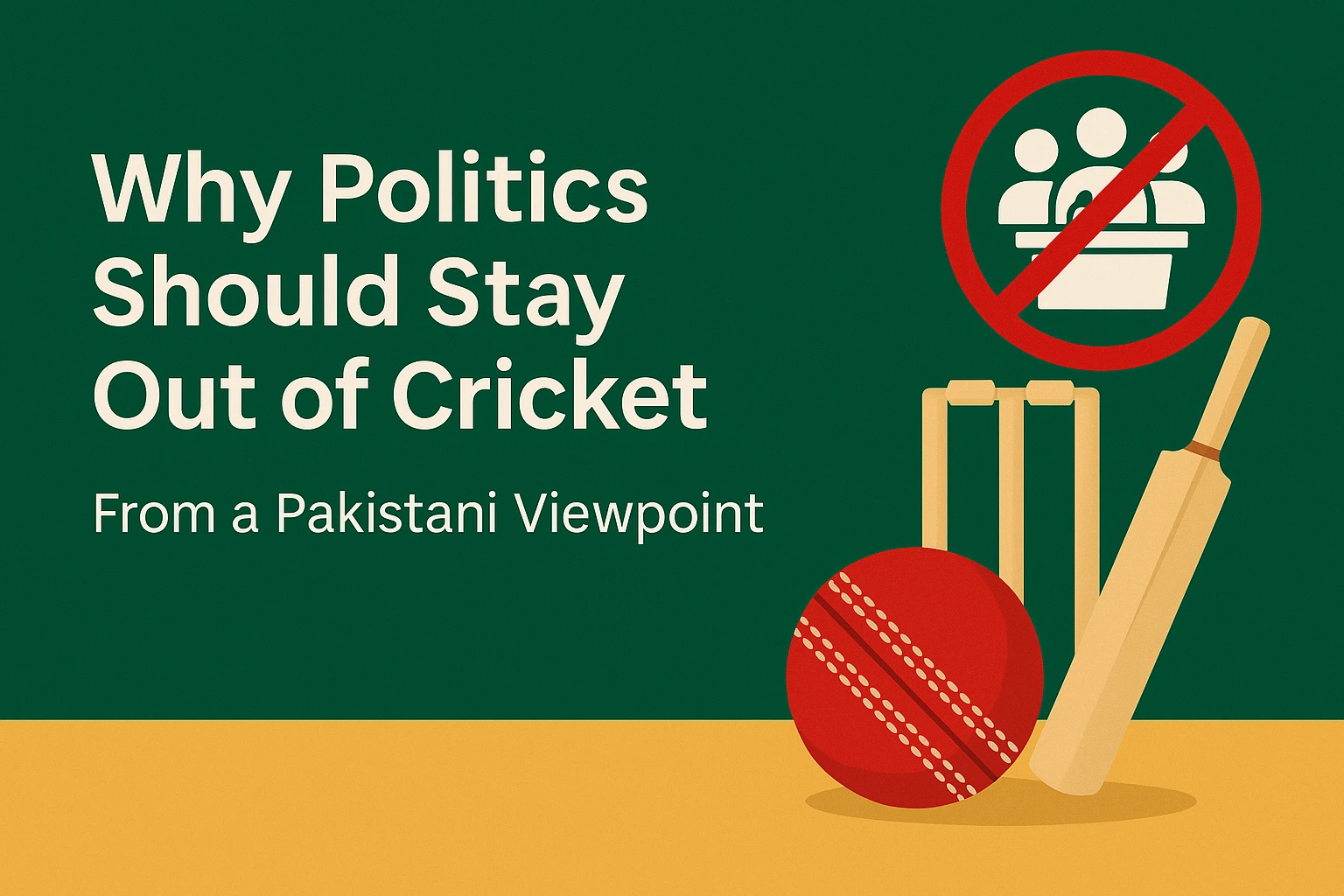In Pakistan, cricket transcends social, ethnic, and economic barriers as a passion rather than merely a game. From the dusty lanes of small towns to the grand stadiums of Lahore and Karachi, cricket fosters a sense of unity like no other. Yet, this beloved sport has often been tangled in the web of politics, which brings challenges far beyond the boundary ropes. Let’s dive into why politics should stay out of cricket, especially from a Pakistani viewpoint.
The Origins of Cricket in Pakistan
British colonial influence spread to Pakistan before the nation was even founded, bringing cricket with it. After independence, the sport blossomed as a symbol of national pride. First and foremost, cricket united people by producing heroes who stood for excellence and hope, such as Hanif Mohammad and Imran Khan. However, as the sport grew in popularity, political forces began to influence it, blurring the lines between sportsmanship and power play.
How Politics Has Interfered with Cricket
Political interference in cricket administration is not a new phenomenon in Pakistan. Politicians have often used cricket boards as platforms for influence and patronage, appointing officials based on political loyalty rather than expertise. This meddling has led to questionable team selections, disrupted training regimes, and created a toxic environment for players. Imagine trying to focus on your game while decisions about your spot depend on political favours—this profoundly impacts morale and performance.

Political Tensions Affecting International Matches
The ongoing political tension between Pakistan and neighbouring countries, especially India, has repeatedly spilt over into cricket. Political disagreements have led to the cancellation of tours and strained cricketing ties that should ideally transcend diplomatic considerations. For instance, political disagreements have sometimes led to boycotts, depriving fans of thrilling contests and players of valuable experience.
The Negative Consequences of Political Influence
When politics enters the cricket arena, fairness and integrity take a back seat. Meritocracy suffers as players are turned into puppets in political games. This breeds corruption and favouritism, which tarnishes the sport’s reputation. The mental stress on players caught amid a political crossfire can be overwhelming, affecting not just their careers but also their well-being. Fans who view cricket as a source of joy and national pride often grow disillusioned, which can impact the spirit and popularity of the game.
Financial and Administrative Mismanagement
Political control often brings corruption and mismanagement. Funds intended for player development and infrastructure are sometimes misused or siphoned off, hindering progress. This lack of professionalism hinders Pakistani cricket from reaching its full potential, frustrating supporters who yearn for international success.
The Role of Media in Blurring Cricket and Politics
Media outlets sometimes fan the flames of political drama around cricket, prioritizing sensationalism over sportsmanship. This distorts public perception, turning cricket discussions into political debates and polarizing fans. Instead of celebrating cricketing achievements, the focus shifts to political controversies, pulling attention away from the sport itself.
Why Cricket Should Remain Apolitical
Cricket should be a sanctuary from political conflicts—a place where players compete fairly, and fans unite. By preventing politics from interfering, the game remains pure, letting skill and diligence determine results. A non-partisan cricket culture fosters unity, national pride, and international goodwill.
Learning from Other Countries
Countries like Australia, England, and New Zealand have managed to maintain relatively independent cricket boards, free from heavy political influence. This autonomy has helped their teams flourish, and their domestic structures remain robust. Pakistan can draw inspiration from these models to establish a sustainable and professional cricket ecosystem.
The Way Forward for Pakistan Cricket
The path ahead calls for stronger, independent cricket governance with transparent processes and accountability. Administrators should be professionals rather than political appointments, and players should be evaluated solely on their merits. Fans and media also play a crucial role by demanding fairness and resisting politicization of the sport.
Conclusion
Millions of people in Pakistan are united by cricket, which is more than just a game. However, the interference of politics threatens this beautiful bond. By keeping politics out of cricket, Pakistan can protect the sport’s integrity, nurture talent, and foster genuine national pride. The game deserves to shine as a beacon of hope and unity, untouched by political agendas.
FAQs
Why does politics interfere so much in Pakistani cricket?
Cricket is a high-profile platform that attracts political interests looking for influence and control, which often leads to interference.
Can cricket stay free of politics in Pakistan?
While challenging, with strong governance, transparency, and public support, it is possible to minimize the influence of politics in cricket.
How does political interference affect players?
It causes uncertainty, unfair team selections, and increased mental stress, which can harm performance and careers.
Has politics ever had a positive influence on cricket in Pakistan?
Occasionally, political support has helped organize tours and develop infrastructure; however, the negatives often outweigh the positives.
What can fans do to keep politics out of cricket?
Fans can demand transparency, support merit-based decisions, and refrain from engaging in political debates surrounding the game of cricket.